The “12 Days of Christmas” is a classic holiday song first published in its current form in 1908. In a nod to the classic carol, join The Hockey Writers as we count down the 12 Days of Hockeymas. Each day, we will provide you with a piece of hockey history as we eagerly await the start of the 2020-21 NHL season.
We are six days away from Christmas, so in this installment of 12 Days of Hockeymas we will check out the six players whose numbers have been retired by the Vancouver Canucks. Some of the names are no-brainers, others may come as surprise, specifically to younger fans or those less familiar with the Canucks’ history. Nonetheless, they are all deserving in their own ways. Let’s take a look.
10 – Pavel Bure
There were four players in the 1989 NHL Draft who went on to be inducted into the Hall of Fame. Pavel Bure, selected in the sixth round by the Canucks, was the latest to be drafted of the four. He certainly would have gone sooner, had other GMs and scouts done their homework. Because of Mike Penny’s diligence, who was Vancouver’s chief scout at the time, the Canucks got their first true superstar in franchise history.
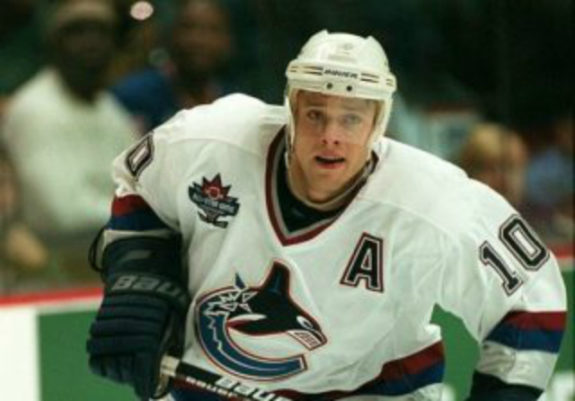
Bure won the Calder Memorial Trophy as the league’s best rookie in the 1991-92 season. He tallied 60 points in 65 games, which was the most points scored by a rookie in Canucks history until Elias Pettersson’s inaugural season. He also holds the highest single-season goal total in Canucks history, scoring 60 in his second and third year in the league. In 1992-93, he was the first Canuck to be named to the NHL First All-Star Team. The Russian Rocket changed his number to 96 before the 95-96 season, but the number 10 is the one that will be remembered forever in Vancouver.
12 – Stan Smyl
Stan Smyl was drafted in the third round by the Canucks in 1978, and the team found success when he became a regular in the lineup. The Glendon, Alberta native played his entire 13-year career with the Canucks, and they made the playoffs in nine of those seasons. He was given the “C” late in the 1981-82 season after captain Kevin McCarthy suffered a season-ending injury. The Canucks went on to make their first Stanley Cup Final appearance that season, but were quickly disposed of by the New York Islanders dynasty.
After the Final appearance, management liked the direction the franchise was moving in, and made Smyl the full-time captain. In his first full season with the “C,” Smyl put up 38 goals and 50 assists, both career highs. He was a model of consistency, scoring at least 20 goals in every season from 1979 to 1987. He sits at fourth place in Canucks history in goals with 262, fourth in assists with 411, and fifth in points with 673. His number 12 was the first number to ever be raised to the rafters in Vancouver.
16 – Trevor Linden
Drafted second overall in 1988, the Canucks had high expectations for Trevor Linden, and he had no problem meeting them. In his rookie season he scored 30 goals and 59 points, and finished second in the Calder voting to Brian Leetch. That year, the Canucks made the playoffs for the first time in three years. Like Smyl, Linden was regarded as one of the greatest leaders in the league at the time. So much so that he was named the permanent captain at the age of 21, the youngest in franchise history.
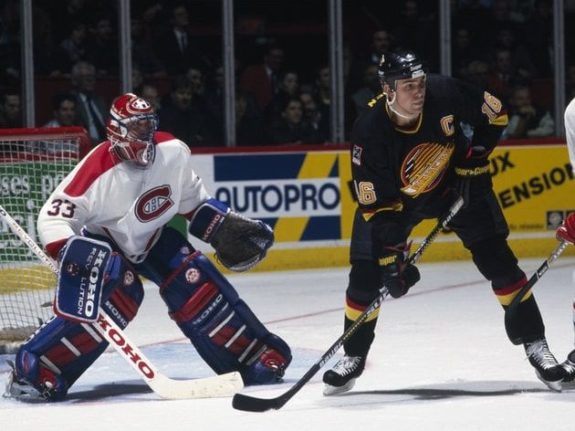
Like many great players, the legend of Linden was born as a result of his production in the playoffs. As captain, he took the Canucks to the postseason in six straight seasons, including a trip to the Stanley Cup Final in 1994. He is the franchise leader in postseason games played (118), goals (34), assists (61) and points (95). A season after his second stint in Vancouver concluded, his number 16 was retired.
19 – Markus Naslund
After going 16th overall in the 1991 draft, Markus Naslund played nearly three seasons with the Pittsburgh Penguins before being traded to the Canucks. His career took off in Vancouver; he would eventually earn First Team All-Star honors in 2002, 2003 and 2004. He also won the Lester B. Pearson Award (now the Ted Lindsay Award) in 2003, and finished second place in the Hart Trophy voting that year.
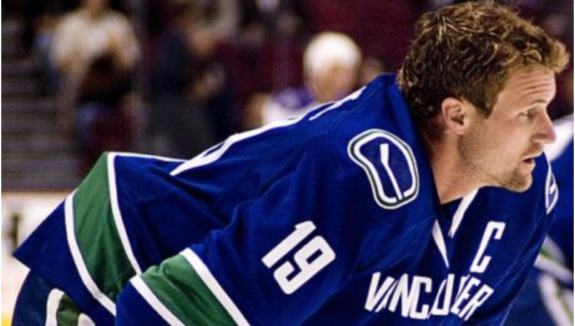
Naslund is second in Canucks history in goals with 346 and third in points with 756. He was the first European-born captain in franchise history, and donned the “C” for eight seasons. He was also the premier member of the legendary West Coast Express line. Many believe he deserves a spot in the Hall of Fame, but his magnificent career did not go unnoticed in Vancouver, as his number was retired in 2010.
22 – Daniel Sedin
Ironically, Naslund wore 22 until his desired 19 became available in his second season with the club. This opened the door for Daniel Sedin to claim the number in Vancouver. Sedin was drafted 2nd overall in the 1999 draft, and became an NHL regular in the 2000-01 season. It quickly became evident that he was the goal-scorer of the Sedin tandem.
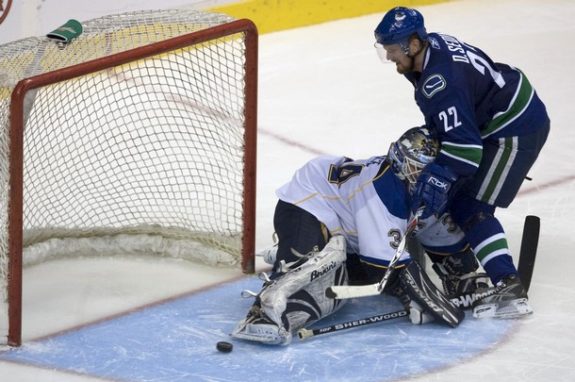
Daniel won the Art Ross Trophy, as well as the Ted Lindsay Award for his accomplishments in the 2010-11 season. He led the league in scoring with 104 points, and was an instrumental piece in a Canucks team that made it to Game 7 of the Stanley Cup Final. Daniel finished his career sitting first in goals scored in Canucks history with 393, second in assists with 648, and second in points with 1041.
33 – Henrik Sedin
In the 1999 Draft, Vancouver traded up to get the 3rd pick, ensuring that Daniel would get to play alongside his brother, Henrik. The two would go on to become one of the most entertaining sets of linemates of all time. Henrik, more known for his playmaking prowess, had an uncanny ability to always find and feed Daniel on the ice.
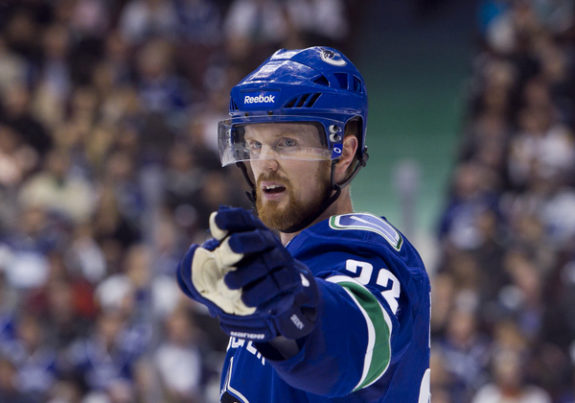
Henrik may have been the later pick, but he would get bragging rights in 2010 when he was named captain of the Canucks. He was also the winner of a few prestigious awards throughout his time in the NHL. He won the Hart and Art Ross Trophies in 2009-10 after producing a league-leading 112 points. He also won the King Clancy Memorial Trophy in 2016, and shared the award with his brother in their final season in 2018. He is the franchise leader in games played, assists and points, and is regarded with his brother as the greatest Canucks to ever play.
All six of these players are extremely deserving of having their numbers immortalized. Roberto Luongo is the greatest goalie in franchise history, so it wouldn’t be a shock to see the number one retired in the near future. After that, it may be a while until the next number goes up into the rafters in Rogers Arena.